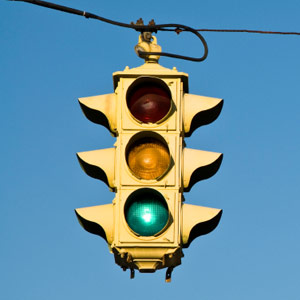
We've seen many exciting developments in transportation lately; electric cars, self-driving cars, ride sharing. But none of these addresses traffic congestion, which is, I think, a far more significant problem.
Traffic signals have always run timed sequences, where the timings for each step are programmed by traffic engineering professionals. The more advanced setups have branches triggered by pedestrian requests or left turn lane sensors, but the steps are still timed.
Traffic signals can be independent, or a number of units can be under the control of a central computer system, such as with a boulevard installation with sychronized lights with offset timings. (The term they use is "progression".)
And we've all been stuck in frustrating traffic situations where the signals just happened to go the worst possible ways at the worst possible times...
What if traffic signals were autonomous intelligent devices, each with an iPhone-like microprocessor, sensors, and connectivity? What if they were able to continuously adjust and optimize their timings for the most efficient possible traffic flow on their own? What if they could replace the monitoring and controlling functions of municipal traffic control centers?
More efficient travel with less traffic congestion could likely save billions of gallons of gasoline and tens of millions of tons of exhaust emissions each year in the US alone. Less road construction would be needed as existing roads are used more efficiently. The possibilities are enormous.
I'll describe the setup:
A municipality could purchase smart traffic signals over time on a replacement basis, similar to the switch to LED traffic lights. Each new traffic signal will improve the performance of nearby smart traffic signals so there is an incentive to add more. The most appreciative customers would likely be suburbs with traffic congestion problems; they could get the advantages of synchronized lights, and more, without the expense of a central computer system.
There are at least 300,000 signaled intersections in the US. International sales would be substantial. Cities and counties are accustomed to spending $50,000 to $500,000 to purchase and install a traffic signal. Annual revenues would be billions of dollars in direct sales alone. This could be an enormous business that has a profoundly positive effect on the environment.
There could be several implementations. One could be a drop-in replacement for current traffic controller electronics, typically located in those weatherproof boxes you see at intersections, and that would interfaces to the existing sensors and lights.
Another possiblity would be an all-in-one traffic light assembly with a self-contained controller and a Lidar unit mounted on the bottom. This would have a low installation cost, and the Lidar unit would be able to monitor traffic very accurately without being an invasion of privacy.
I'm not seeing evidence of anybody currently doing anything like this. There is a new development in traffic signals called "Adaptive Traffic Control" (DOT: Adaptive Signal Control Technology), but all implementations so far seem to be major projects involving a central computer system. There are some experiments in the references below, certainly, but I don't see any patents, or solid progress, or any in use, or anybody approaching it the way I've described here.
In 2013 the city of Los Angeles finished a $400 million project to sequence all of their 4500 traffic signals from a central computer facility staffed with traffic engineers. (NY Times: To Fight Gridlock, Los Angeles Synchronizes Every Red Light) It doesn't appear to have helped; Los Angeles has the worst traffic in the world according to a 2017 Inrix study.
This is doable right now; no new technology is necessary, and the algorithms can be developed over time. The market, world wide, might to be somewhere around $100 billion.
Zubillaga, et al: Measuring the Complexity of Self-Organizing Traffic Lights
Berman: How AI Turns Traffic Lights Into Intelligent Agents
Chavan: Design of Intelligent Traffic Light Controller Using Embedded System
Carnegie Mellon University: Smart Traffic Signals
Carnegie Mellon University: Smart Signals — Pilot Study on Traffic Lights Reduces Pollution, Traffic Clogs
US Department of Transportation: Manual on Uniform Traffic Control Devices
Phys.org: Smarter programming of stoplights could improve efficiency of urban traffic
BBC: How smart traffic signals may ease your commute
NY Times: Choreographing the Dance of Traffic Lights
Ghena, et al: Green Lights Forever: Analyzing the Security of Traffic Infrastructure
Boston Transportation Department: The Benefits of Retiming/Rephasing Traffic Signals in the Back Bay